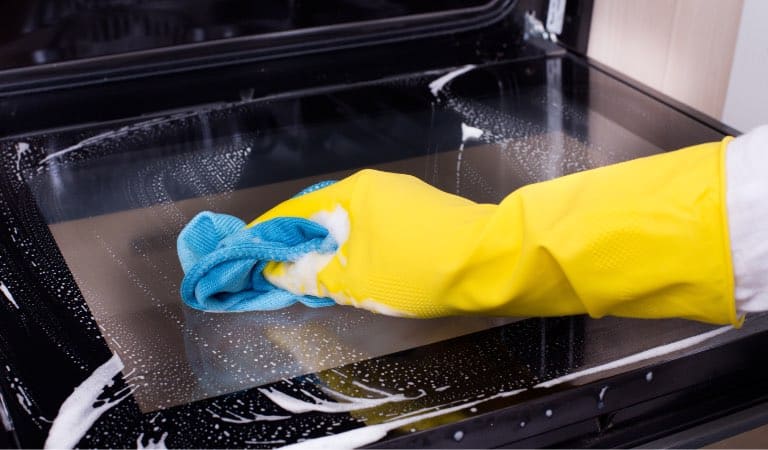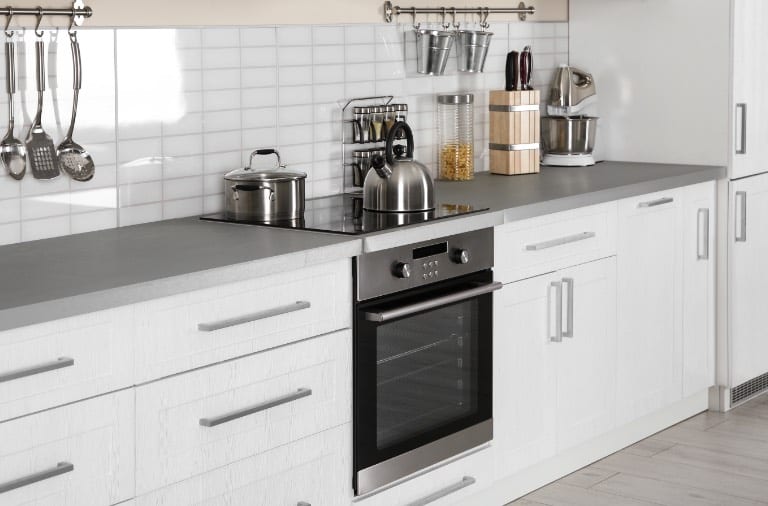Welcome, landlords and tenants alike! Today, we’re diving into a topic that’s as hot as a fresh-baked scone straight from the oven: how new should an oven be in a rented property? This isn’t just about keeping up with the latest kitchen trends; it’s about legal responsibilities, tenant rights, and maintaining a cosy, functional home.
You might be asking, “Landlord, should I provide a new oven?” or “Tenant, is it okay to use an older oven?” Buckle up as we delve into these questions.
We’ll decode the Landlord and Tenant Act 1985, discuss what ‘reasonable’ cooking facilities look like, and clarify who’s responsible for repairs or replacements.
With my background as a seasoned landlord, I’ll ensure the information is practical and engaging.
By the end, you’ll better understand what to expect from an oven in a buy-to-let and how to handle any issues.
Let’s get started! A kitchen without a working oven is like a day without a sunrise – it can be dull and not nearly as warm!
Contents
How New Should an Oven Be in a Rented Property?
When it comes to the oven in a rented property, there’s no one-size-fits-all answer.
According to the Landlord and Tenant Act 1985, landlords are legally responsible for ensuring that their rental properties are fit for human habitation. This includes providing cooking facilities in good working order. While the Act doesn’t specify how new an oven should be, it does require that appliances are safe, efficient, and capable of performing their intended function.
The term ‘reasonable’ cooking facilities is open to interpretation. However, it generally refers to appliances that are in good condition, clean, and safe.
If the oven is so old that it poses a health and safety risk, such as a leak or fire risk, the landlord must address the issue.
The same applies to hobs. They should be in working order but don’t have to be the latest model.
As a landlord, you’re not required to provide a top-of-the-range cooker with a glass door, but you should ensure that the oven and hob are a standard size and can be used safely. The goal is to provide a functional, safe space for the tenant to cook, not a showroom.
What Are the Responsibilities of Landlords Regarding Ovens?
Landlords must ensure that their properties are fit for human habitation, which includes providing cooking facilities that are clean and in good working order at the start of the tenancy agreement.
If an oven breaks down during a tenancy, it’s usually the landlord’s responsibility to repair or replace it. However, if the tenant has caused the damage, the landlord may be able to deduct the cost of repairs or replacement from the tenant’s deposit.
It’s a good idea for landlords to have a clear oven maintenance and repairs policy in their tenancy agreements to address issues like a broken oven. This can help to prevent misunderstandings and disputes, especially regarding white goods maintenance responsibilities.

For example, the agreement could specify that the tenant is responsible for cleaning the oven regularly and reporting any issues promptly. At the same time, the landlord is responsible for carrying out repairs or replacing the oven if necessary. In general, landlords should aim to provide ovens that are in good condition, clean, and safe to use.
This might mean a relatively new oven or an older oven that’s been well-maintained.
What Are the Responsibilities of Tenants Regarding Ovens?
Tenants should use appliances reasonably and report any problems to their landlord immediately.
If an oven malfunctions, they should let their landlord know straight away. DIY repairs are not recommended unless you’re qualified. If you accidentally damage the oven, you might have to cover the repair or replacement costs.
Regular cleaning can prevent issues like grease fires or bad smells. Also, avoid overloading the oven and harming the heating elements or other parts.
In essence, treat the oven well and promptly alert your landlord to any problems. This approach helps keep the oven safe, efficient, and ready for use throughout your tenancy.
Can Tenants Demand a New Oven for Their Rental Property?
Tenants can’t demand a new oven simply because the current one is old or unfashionable.
However, if the oven is broken and beyond repair, the landlord is responsible for replacing it.
The obligation lies with the landlord to maintain the property to a standard that is safe and suitable for human habitation. This doesn’t necessarily mean the oven needs to be brand new, but it should be in good working condition, free from health hazards like mould, leaks, or electrical faults.
So, while tenants cannot demand a new oven just because it’s unfashionable, they can expect to get a new one if it stops working and is beyond repair. It’s all about ensuring that the oven is safe, efficient, and capable of performing its intended function.
How Often Should Ovens Be Replaced in Rental Properties?
There’s no hard and fast rule for how often ovens should be replaced in rental properties, as it largely depends on the quality of the appliance and how well it’s maintained.
However, as a general guideline, it’s a good idea for landlords to budget and consider replacing ovens every 10 to 15 years. This can help to ensure that the oven remains safe, efficient, and capable of performing its intended function.
If a tenant reports an issue with the oven, the landlord should respond promptly and take appropriate action to resolve the issue. This might involve repairing the oven, replacing it, or offering the tenant a suitable alternative while it is being repaired or replaced.
The real secret? Good communication.
Landlords and tenants should work together. This way, they can keep the oven in top shape and quickly tackle any issues.
In short, while there’s no fixed rule, every 10 to 15 years is a good guideline for oven replacement in rentals.
Related Articles
How Much Can A Landlord Charge For Cleaning?
Discover the Best Furniture for Rental Property
Is The Landlord Responsible For Fixing A Washing Machine?
Conclusion
In conclusion, the age of an oven, a common white good in a rented property, is not strictly defined by law.
Landlords must provide cooking facilities in a reasonable state of repair, including a hob and oven, at the start of a tenancy. However, the definition of ‘reasonable’ can be a grey area.
If an oven is broken or not working properly, tenants should contact their landlord to request a repair or replacement. While landlords don’t need to provide brand new appliances, it’s generally a good idea to provide reasonably modern ones to ensure tenants can use them effectively and safely.
Regular communication between landlords and tenants about the condition and maintenance of the oven can help prevent disputes and ensure a comfortable living environment.

